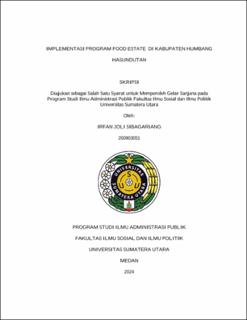| dc.description.abstract | The food estate program is one of the national strategic programs (PSN) 2020-2024 with the aim of developing food in several sectors in an integrated manner in certain areas. Humbang Hasundutan, as one of the regions with potential agricultural land, is integrated in this program to increase food self-sufficiency. However, challenges such as climate constraints, lack of intervention in capitalizing infrastructure and supporting technology, and low efficiency in land management are obstacles in achieving food self-sufficiency. This study aims to determine and understand the implementation of the food estate program in Humbang Hasundutan Regency.
The research method used in this research is qualitative research method. Data collection was carried out using interview, observation and documentation techniques. The data obtained were analyzed using the Van Meter and Van Horn model implementation theory approach with variables of policy objectives, resources, communication, characteristics of the implementing agency, social and economic conditions, and disposition.
The results of this study indicate that the implementation target of the food estate program in Humbang Hasundutan refers to the technical guidelines contained in the Master Plan for the Development of the Food estate Program. In the implementation resource variable, the government provides basic infrastructure of roads, irrigation, and mechanization, for farming capital the government through the transition team provides investors. Communication variables, all parties carry out their respective roles by establishing coordinated communication through the transition team. The characteristics of the implementing agency of the food estate program are carried out in accordance with the formulation of the Food estate Master Plan with a coordination team by the Ministry of National Development Planning / Bappenas in coordinating, monitoring and evaluating in order to accelerate the decision making required in the implementation of the master plan. Then the social and economic environment variables of the implementation of the food estate program in Humbang Hasundutan get community support through the willingness of farmers to cultivate their land. Furthermore, the disposition variable shows the response of program implementers in dealing with problems ranging from capital to marketing production. Research recommendations in realizing food self-sufficiency in Humbang Hasundutan are with the support of the government and the community to maximize success in producing optimal cultivation productivity. | en_US |


